Busy, highly stressed, or sensitive women may struggle with sleep, as may those who’ve had major life events. Traditional “sleep hygiene” methods may prove insufficient for this group. Instead, consider using EFT Tapping for better sleep, or add it to your usual measures. EFT – or Emotional Freedom Techniques – is a practical drug-free way to promote calmness in body and mind. Self-applied EFT can even be done at night!
 Your nervous system can’t relax
Your nervous system can’t relax
Poor sleep is not a condition, it’s a symptom. It indicates that your nervous system can’t relax. Maybe you can’t get to sleep easily, or you wake and can’t resettle. Alternatively, you wake earlier than you’d like. Or perhaps you’re so busy that you struggle to switch off your “monkey mind”. So you’re too alert and toss all night.
Unless you have an obvious cause such as an illness or you live on a flightpath, usually your nervous system is keeping you awake. It’s hoping to get your attention so you address your stress or unresolved issues. By attending to these, particularly through tapping, you’ll often settle into better sleep.
Conflicts underlying poor sleep
German New Medicine (GNM) is a health paradigm gaining increasing recognition. It focuses on what emotional conflicts are disrupting the body and mind. GNM suggests that poor sleep results from being in active conflict (stress). This may relate to a current stress or anticipated future events. Other causes of poor sleep include unresolved emotions or past traumas:
The underlying cause of all sleep disorders, including insomnia, is stress… The subconscious instinct to stay alert may not go away. [Especially if] you are constantly triggered by new, similar situations that remind you of [a] past stress…. Use EFT to address your daily stress triggers, and let go of any stress that you have about sleeping (or not sleeping). Then a balanced sleep pattern will naturally emerge
(Gabrielle Rutten & Gary Craig 2023, in “Official EFT A-Z”, pp 281-282).
Better sleep with EFT tapping
EFT Tapping is an effective tool to clear the stress and emotional contributors of any issue. EFT is a somatic (body-based) technique that calms you at the physiological level. Research shows that EFT balances your heart rate and blood pressure. It also switches off genes that cause inflammation. Tapping on acupoints calms the brain’s fear centre (the amygdala). This enables your nervous system to move away from the flight-fight-freeze response triggered by chronic daily stress. You can settle back into the balanced zone!
 Through tapping, you can also weaken the neural pathways associated with limiting beliefs and unresolved negative emotions. This can include shock, fear, grief, shame, guilt, anger, resentment and more. Studies show that EFT is also effective in improving sleep quality during illness, including among kidney patients and women with breast cancer (see research links at end).
Through tapping, you can also weaken the neural pathways associated with limiting beliefs and unresolved negative emotions. This can include shock, fear, grief, shame, guilt, anger, resentment and more. Studies show that EFT is also effective in improving sleep quality during illness, including among kidney patients and women with breast cancer (see research links at end).
Sleep has been great. I’ve woken up feeling like I’ve slept! I also tapped three times yesterday and it did help with my stress levels. (Kim, Senior Insurance Specialist, tapping with Lareen to reduce work-stress)
Basic targets for tapping
To develop a strategy for better sleep using tapping, you can employ different approaches. Some are easy self-administered approaches. Others will require assistance from an experienced EFT Practitioner. Start by tapping on your emotions and thoughts about sleep and your sleeping environment. Engage in daily tapping to alleviate everyday stress, and then focus on deeper issues such as unresolved trauma or ongoing conflict.
Start with the following basics. Tap the intensity of each down to zero:
1. Tap about how you feel about your sleep – such as “I’m so frustrated I can’t fall asleep easily”, “I’m so tired of my sleep problem!”
2. Address beliefs that keep proving true – such as “I’m a bad sleeper”, “I”ll never sleep well again”, “Nothing works to solve my sleep issues!”, or “I just can’t sleep in this room!”.
3. Tap about your environment – tap to reduce stress such as discomfort with your bed or annoyances from noise. Or maybe you’re irritated by a tossy co-sleeper.
Working on these areas alone can help reduce tension and stress for better sleep. I also make 10-15 minute guided tapping audios available so clients can easily tap on these issues each day.
Next steps with tapping
With a basic understanding of tapping, you may be able to try steps 4 and 5 yourself:
4. Daily stress dial-down – Dedicate 15-20 minutes to daily tapping to lower your stress before bed. It’s good to develop the habit of tapping on one or two things that happened today that still bother you. (Also see section below on the Daily Stress-Barometer Check).
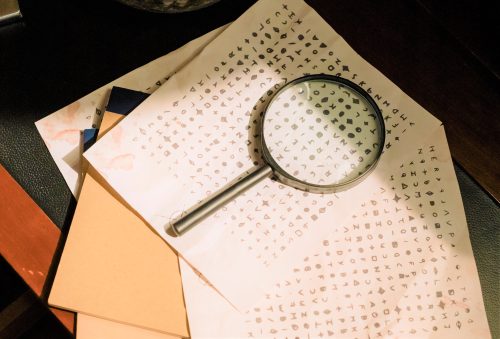 5. Night-time detective work – When you can’t sleep, or you wake, be curious about the cause. Is it worry about tomorrow or lingering concerns about today? Pay attention to recurring thoughts and images, and who you saw or talked to today. Using what you find, do some tapping rounds and hopefully you’ll drift into sleep.
5. Night-time detective work – When you can’t sleep, or you wake, be curious about the cause. Is it worry about tomorrow or lingering concerns about today? Pay attention to recurring thoughts and images, and who you saw or talked to today. Using what you find, do some tapping rounds and hopefully you’ll drift into sleep.
At night you can use less disruptive tapping: a) Massage the tapping points. b) Hold your fingers on each point for a few seconds. c) Imagine in your mind that you are tapping each point. d) Tap or pulse the fingerpoints (side of each nailbed).
Even if you don’t know what’s stopping you sleeping, you could assume you’re feeling scared, unsafe or powerless about something. So simply tap a few rounds on “Feeling powerless”, “I feel unsafe” or “This fear”, and see if you feel any better. Make a note to tap on or find the actual problem some time soon during the day. Or book a tapping session for more help. You may also have physical symptoms you can tap down such as twitchy legs or a tight neck.
Daily stress barometer check
One useful support task is becoming aware of your daily stress levels. Close your eyes and tune into your body and mind. Rate your stress on what I call a Stress Barometer. With a scale of 0-10 (0=totally relaxed; 10=completely tense/stressed) take a rough guess at how tense or busy your mind is. And how stressed or tense your body is. You may be surprised!
Mind Tension? = 9/10!
Body Tension? = 6/10
Perform this check multiple times a day. It will give you insight into how much stress and tension you carry. And it will guide you in using the Daily Stress Dial-Down tapping (point 4 above). If deeper issues persist, consider booking a Clarity Call with me to discuss personalised support. Ann, a busy lawyer, contacted me for help to reduce her work overwhelm and found that:
From big issues to tiny decisions that I was stuck on, tapping helped me with them all. Especially the day I declared I was too tired, wired and overwhelmed to tap. Lareen convinced me that was a perfect time to tap! It was! I regained my calm, my focus got what needed to be done completed and I had a wonderful sleep!
Deeper or longer-standing issues
If steps 1-5 don’t bring a better night’s sleep, deeper issues are probably stopping your nervous system from winding down. For long-term sleep disturbances with no known medical or mental health cause, you may need at least 6-12 weeks or more of regular tapping sessions and self-tapping. This is especially the case if you have a whole lifetime of poor sleep. And especially if you have a large backlog of emotional baggage. Tapping can still help reduce the stress aspects of poor sleep and daily life while you receive help from medical or mental health professionals.
For more persistent sleep issues, tapping weekly or fortnightly with a practitioner can really help. You can augment this for faster change with daily tapping yourself. And you can add some of the physical and meditative supports below. Next-level tapping with a practitioner would address:
6. Unresolved sleep associations: an EFT practitioner will help you identify and process assocations related to sleep. This might include childhood memories lying in bed unwell or hearing family arguments, or being fearful of sleeping alone. Perhaps you remember lying alone in a hospital at a certain age. To locate these events, we investigate when your sleep problems started. Or we pinpoint when you learned to sleep lightly. Even if you don’t know, the tapping process unravels the cause.
7. Unresolved traumas: traumatic experiences can affect your body, mind and spirit and cause or contribute to sleep difficulties. A practitioner can help you use EFT tapping to release the unresolved emotions and images of trauma. That includes grief and loss that you thought you’d put behind you. Or even minor car accidents that may have left you with unaddressed shock. Any negative emotion or traumatic experience that is still unresolved – even from decades ago – sits in your nervous system. That is, until you release it with a body-based (somatic) approach such as EFT.
Trauma is encoded directly into the body and not through language. This means that simply talking about a traumatic experience cannot clear it. And it can keep getting triggered in daily life, perhaps leaving you wondering why you can never relax. Or it means that you never react just to what’s happening right now. You’re also reacting to everything similar that ever happened to you that’s still unresolved behind the scenes.
 Other sleep tips for busy women
Other sleep tips for busy women
Over the years I’ve discovered additional ways to improve sleep beyond traditional measures such as adjusting the room temperature, or using natural melatonin or lavender pills. Common recommendations like these may not be sufficient for busy women, including trying to get a busy mind to do mindfulness (in my article EFT as an Alternative to Mindfulness and Positive Thinking I explain why!).
So the ideas below can complement your tapping practice and assist as you reduce stresses or trauma with tapping.
To enhance your sleep routine, choose one Tapping focus, one Physical support and one Meditative support from the options below. Ask yourself “Does this make me feel better? Does this make me feel good?”. If something doesn’t feel good after 3-5 days, try a different combination!
i) Physical supports – body help
Allocate more relaxation time by day, even if you’re in challenging home or work environments. A relaxed body during the day facilitates better sleep at night. Hot-packs on your chest or abdomen, or in/on your palms can give a calming effect. However, beware of getting too hot before sleep. Experiment with how many hours before bed to bathe or shower so you’re not still holding heat. You could also try a weighted blanket or an eye pillow for extra comfort. And creating a “head cloud” with a soft towel or small cosy blanket can also feel soothing. Roll it and tuck it in a C-shape around your head, ears and neck as you’re lying.
As you’re resting, perhaps try Chinese belly self-massage – we hold a lot of stress in our belly (see video link below). Also explore simple vagus nerve self-massage on the head and neck any time. Suki Baxter’s popular free Youtube videos provide valuable guidance (see link at end). Finally, if you’re still not getting relief, a therapist in kinesiology and cranial-sacral therapy can do a full body balance. They may also reset your amygdala (your fear centre) and pineal gland (your melatonin-producer).
Food and drinks are extra things you can test in relation to sleep. Personally my night sleep is usually not good after wine or other alcohol later than lunchtime. Sometimes decaf coffee, regular coffee, black tea and green tea do the same if I have them after midday. I also find sugar makes me unsettled and sometimes hot and sweaty, especially too much chocolate, cake, or almond milk. Again, try changing one thing at a time and see if anything improves.
ii) Physical supports – gentle body movement
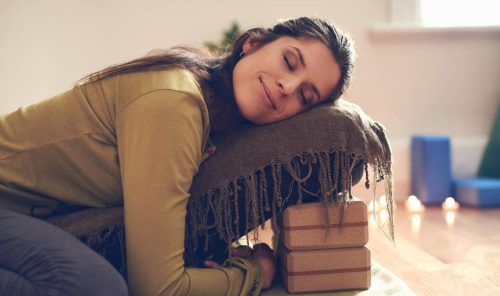 Practice extreme breathing, breathing very deeply and slowly to increase oxygen intake and move blocked energy. Women who are stressed often breathe very shallowly. Try some Yogic Breathing (see link below). Lay down and breathe deeply and slowly as you visualise your breath flowing into one tense body area at a time. It may take up to 1hr or more for your whole body to relax, but it can feel great! (Note: if you experience anxiety, approach deeper breathing cautiously as it can potentially exacerbate anxious feelings. Instead do a Tapping To Release Constricted Breathing exercise).
Practice extreme breathing, breathing very deeply and slowly to increase oxygen intake and move blocked energy. Women who are stressed often breathe very shallowly. Try some Yogic Breathing (see link below). Lay down and breathe deeply and slowly as you visualise your breath flowing into one tense body area at a time. It may take up to 1hr or more for your whole body to relax, but it can feel great! (Note: if you experience anxiety, approach deeper breathing cautiously as it can potentially exacerbate anxious feelings. Instead do a Tapping To Release Constricted Breathing exercise).
Gentle stretching or Restorative Yoga can also increase oxygen and lymph circulation to help you relax. It’s luxurious to feel your fascia layers unwind in supported easy poses. You take about 7 minutes for each pose over about an hour. Do give it a go! (see link at end). Alternatively, a Yoga Nidra meditation can be great, where you’re guided to sequentially tense and relax different muscles. And take caution with exercise: Heavy exercise may not always benefit your sleep if you’re highly stressed. It can further strain your exhausted adrenal glands and potentially lead to exercise-induced insomnia! Read more about exercise and sleep in my dedicated article on that topic. Instead, opt for gentle stretching, restorative yoga, tai-chi or its easier cousin qi-gong.
ii) Physical supports – environmental help
Noise-reducing earplugs for sleep can really reduce noise irritation. At the same time, you can work on reducing any noise sensitivity with tapping. Create your Slumber Environment by decluttering your sleeping space and remove items that don’t promote a positive atmosphere. Dim the lights 2hrs before sleep. Instead, consider lighting some beeswax candles along with calming music for a slumbery mood.
 iii) Meditative supports
iii) Meditative supports
Minimise screen-time before bed, especially from mobiles, TV or other devices. Highly sensitive women may need to experiment turning off screens at least 3hrs before sleep to avoid sleep-disrupting noise, light and emotions. If you feel you can’t resist checking email or texts, consider tapping about that! And when watching TV or social media, choose calming content such as slow sports, gardening, cooking or travel instead of emotionally charged content.
Relax your eyes and brain by avoiding excessive scrolling or reading in the 2-3hrs before bedtime. These can particularly overstimulate highly sensitive or very stressed individuals. Various forms of meditation have helped a number of my clients gain faster progress with their tapping. Even just 20-30 minutes a day can accumulate into a big difference over time. And if your mind struggles to relax into meditation, you can tap about that beforehand!
Ecomeditation is a 20 minute free meditation to download from well-known EFT researcher Dawson Church. It has 4 options: male/female voice, and with/without background music. It combines the best and latest science-backed techniques to get quickly into the deeper relaxation brainwaves (see link below).
 Finally, how much sleep do we need?
Finally, how much sleep do we need?
How much sleep do you need to function at your best? Five sleep experts were asked and they recommend 7 to 9 hours per day for most people. However, that amount can decline as we age. It’s advisable to get at least 7 hrs per day to prevent depression. And you may need more sleep if you’re recovering from childbirth, illness, injury etc, have high stressloads, or have babies or young children who keep you up at night or wake you early. Experts say if you think you require 6 hrs or less, chances are you’re chronically sleep-deprived.
Good luck!
I genuinely hope you find a combination of these ideas that will ultimately help you achieve deep and restful sleep most of the time. Remember to revisit these strategies during challenging times, as life tends to throw curveballs. Let me know what works for you. And feel free to reach out to me for tapping support, tapping lessons, or assistance with stress relief. Best wishes!

Lareen Newman is a Women’s Coach for Stress Release and Emotional Therapy. Lareen is passionate about helping women to offload their stress and negative emotions through EFT Tapping so they re-energise and experience more joy and peace in their life. She also loves to educate women to better understand their stress, their emotions and their nervous system. Check out Lareen’s homepage for more information or to join her mailing list, or book a free 20 minute Clarity Call with her to discuss if she’s the right person to help you reduce your work stress or life stress, or to change your life direction.
LINKS – HAPPY READING, HAPPY LISTENING!
“Official EFT A-Z: How to use both forms of Emotional Freedom Tecniques for Self-healing” Gabrielle Rutten & Gary Craig, paperback.
Feasibility and effect of emotional freedom therapy on sleep quality in patients with end-stage renal disease receiving maintenance hemodialysis: A pilot study. Tang et al 2023, online research paper, in Geriatric Nursing Journal.
Comparing the effect of emotional freedom technique on sleep quality and happiness of women undergoing breast cancer surgery in military and nonmilitary families: A quasi-experimental multicenter study Kalroozi et al 2022, abstract of research paper, Perspectives In Psychiatric Care (online journal).
EFT tapping alters gene inflammation/expression: online summary of research paper, by Dr Craig Weiner
Clinical EFT (Emotional Freedom Techniques) Improves Multiple Physiological Markers of Health Full research paper free online, Bach et al (2019)
Yogic Breathing: Medical News Today, online article
Restorative Yoga: 3 Common Misconceptions Andrea Peloso at Yoga International, online article
Chinese Belly Self-Massage with Lee Holden (free Youtube video, 6mins)
Polyvagal Exercise (releases neck, eye and head tension) Suki Baxter (free Youtube video, 6 mins)
Vagus Nerve Exercises Suki Baxter (free Youtube video, 14 mins)
Vagus Nerve Massage Suki Baxter (free Youtube video, 15 mins)
Ecomeditation (free download), from Dr Dawson Church
Does Everyone Need Eight Hours of Sleep? The Conversation, 2018 online article
Photo credit thank yous to: Article header pic from Bruce Mars, Unsplash.com; Bright-eyed woman from Gratisography, Pexels.com; Happy morning from Alena Shekhovtcova, Pexels.com; Magnifying glass from Cotton Bro Studio, Pexels.com; Thermometer from Free-Canva.com; Cosy dog from Christian Domingues, Pexels.com; Restorative Yoga pose from Yoga International; Floating candles from Cup of Couple, Pexels.com; Red alarm clock from Malvestida on Pexels.com
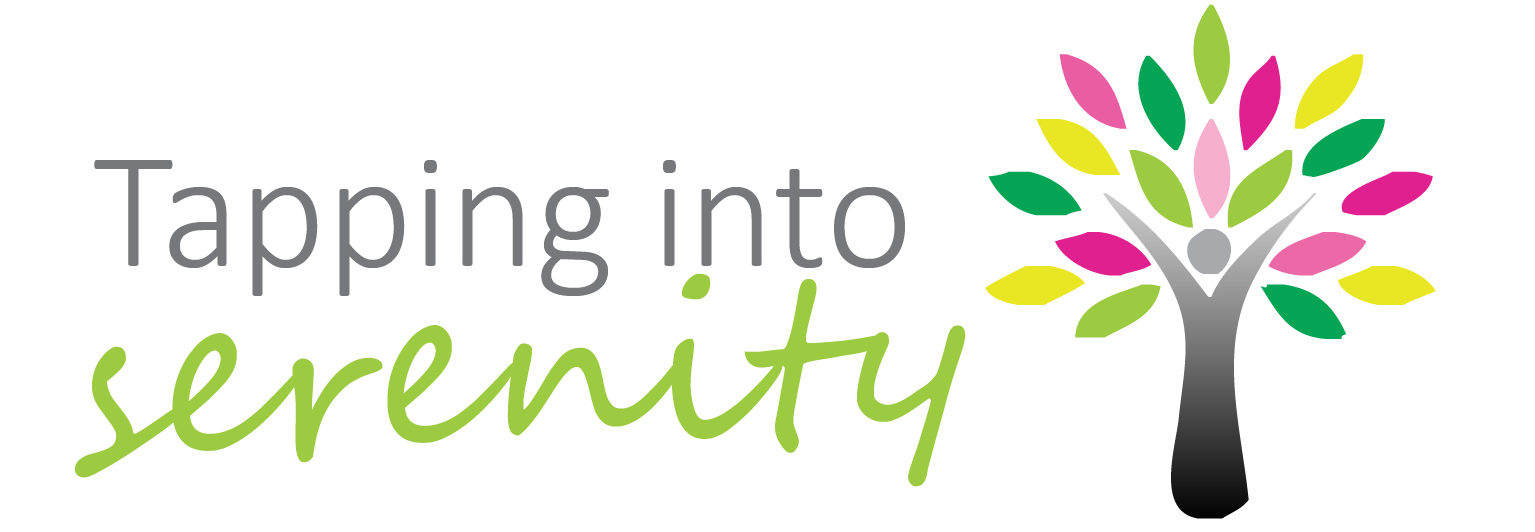
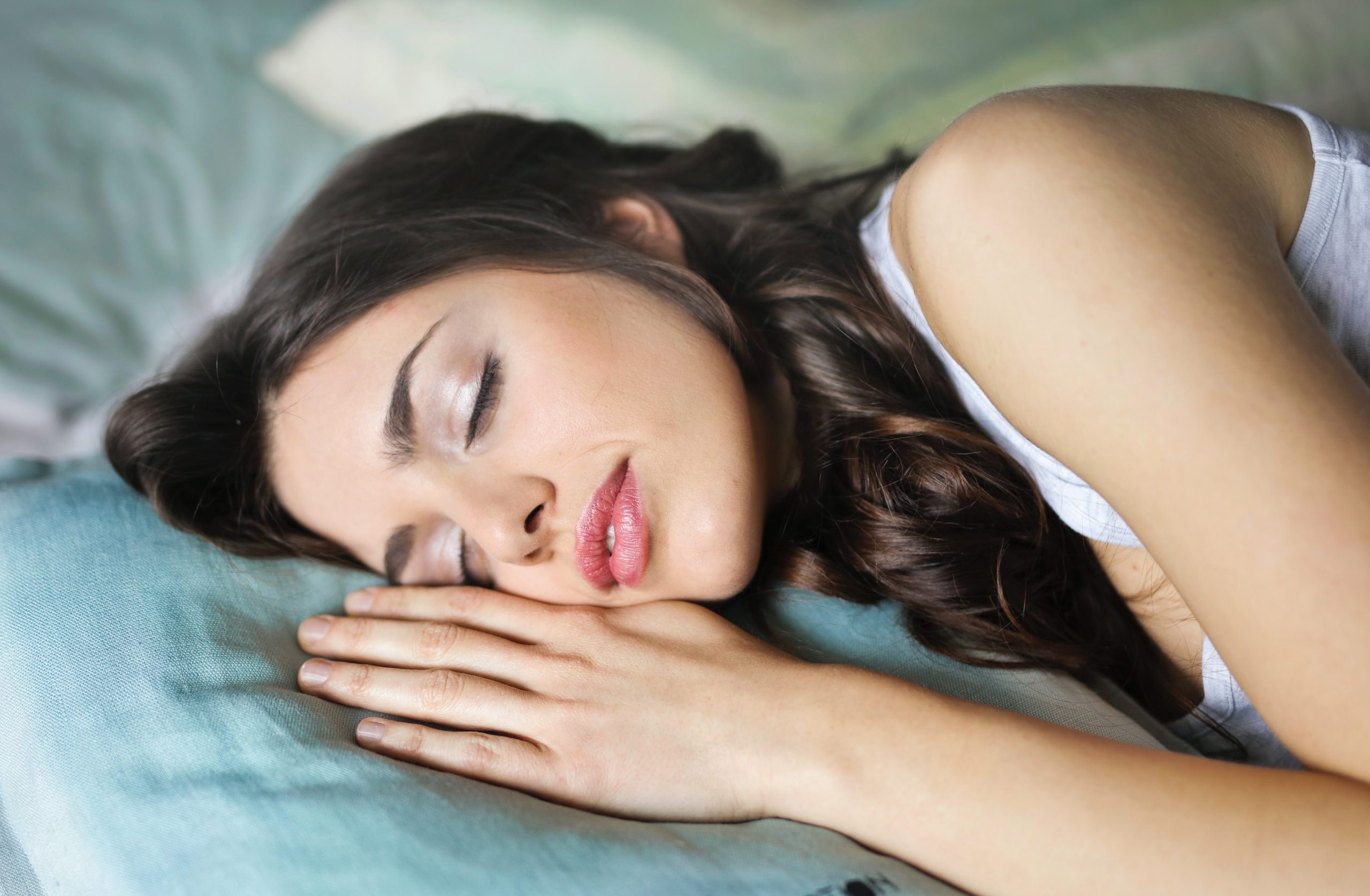
 Your nervous system can’t relax
Your nervous system can’t relax From big issues to tiny decisions that I was stuck on, tapping helped me with them all. Especially the day I declared I was too tired, wired and overwhelmed to tap. Lareen convinced me that was a perfect time to tap! It was! I regained my calm, my focus got what needed to be done completed and I had a wonderful sleep!
From big issues to tiny decisions that I was stuck on, tapping helped me with them all. Especially the day I declared I was too tired, wired and overwhelmed to tap. Lareen convinced me that was a perfect time to tap! It was! I regained my calm, my focus got what needed to be done completed and I had a wonderful sleep!  Other sleep tips for busy women
Other sleep tips for busy women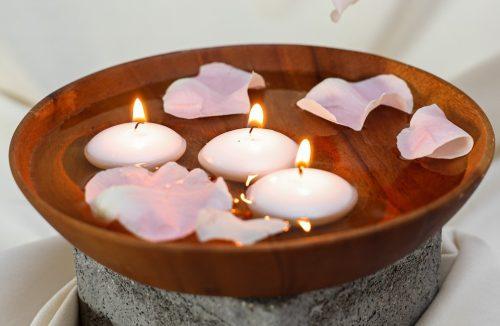 iii) Meditative supports
iii) Meditative supports Finally, how much sleep do we need?
Finally, how much sleep do we need?